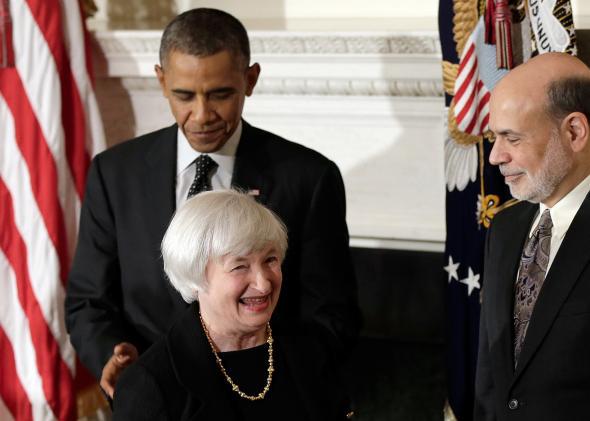Last night, addressing a joint session of Congress for the annual State of the Union address, President Obama completely ignored the single most important lever he has at his disposal to boost the economy in the short term.
That’s too bad, because the speech was delivered under tough circumstances. The White House team clearly felt they needed to deliver an address that signaled awareness of and empathy with the struggles of ordinary Americans in a still-weak economy. They also wanted a constructive speech rather than a partisan stemwinder. But with it obviously inconceivable that Congress would authorize a brand new $350 billion stimulus program—or, indeed, doing anything else ambitious—this left him without much to talk about that would address the short term. They came up with some very creative executive actions, but per the design of the Constitution these will have limited effect. And they mostly talked about moderately scaled ideas that, like most policy ideas, address long-term issues.
What Obama didn’t talk about, as usual, is the Federal Reserve which does have the power to act in the short term to boost the economy.
Today will be the last monetary policy statement of the Ben Bernanke era at the Fed. Obama has appointed Janet Yellen to succeed him, and she’s been confirmed by the Senate. Obama has also nominated Stanley Fischer to replace Yellen as vice chairman of the Fed. Congress hasn’t confirmed him yet. He’s also nominated Fed Board of Governors member Sarah Bloom Raskin to a job as deputy secretary of the treasury and he’s appointed Lael Brainard, an undersecretary of the treasury, to replace Raskin on the Fed board. Neither of them have been confirmed yet. And then there’s a lingering Fed vacancy for which Obama has nominated nobody.
This question of what will Yellen, Fischer, and Brainard do and of who will be the fourth person to join them and what will she do is the dominant public policy driver of the labor market over the next couple of years. And yet nothing was said.
It’s not surprising at this point to see the Fed completely neglected in a major political speech or in the post-speech wrangling. But it is disappointing. Is the Fed going to look at the falling unemployment rate and decide it’s time for a return to normalcy, or is the Fed going to look at broader measures of economic slack (low inflation, low labor force participation, low wages) and try to drive us to recovery? That’s the question that will determine whether the State of the Union a year from now is cheerier in tone.
